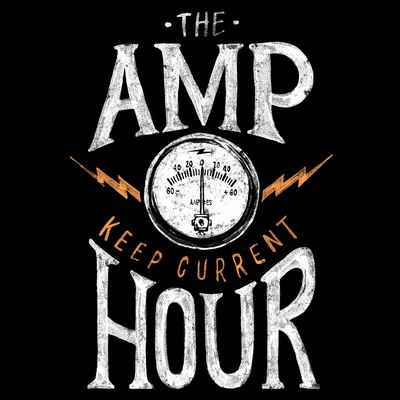Chris Gammell and Dave Jones' voices span the chasm of thousands of miles each and every week to speak to each other and industry experts about where the field of electronics is moving. Whether it be a late breaking story about a large semiconductor manufacturer, a new piece of must-have test equipment or just talking through recent issues with their circuit designs, Chris and Dave try to make electronics more accessible for the listeners. Most importantly, they try and make the field of electronics more fun. Guests range from advanced hobbyists working on exciting new projects up through C-level executives at a variety of relevant and innovative companies. Tune in to learn more about electronics and then join the conversation! Visit The Amp Hour website for our back catalog of 150+ episodes.
https://theamphour.com
#487 – An Interview with Kerry Scharfglass
Welcome, Kerry Scharfglass (@borgel)!
This episode is sponsored by Screaming Circuits, who are operating throughout the COVID-19 shutdown to serve medical customers. If you need priority service for a medical device related to Coronavirus, please let them know upon checkout. All other orders will be on a non-standard timeline guarantee (because of staffing, priority orders), but will have the same high quality assembly that Screaming Circuits is known for.
- Kerry was using Upverter for layout and switched to KiCad.
- He was designing a badge for DEF CON, which he did multiple years.
- The Dragonfly Badge was based upon Neal Stephenson’s Diamond Age
- Synchronizing clock over IR helped each piece of hardware coordinate patterns.
- Kerry has done two HDDG talks:
- From 1 to 100: Scaling and Selling a Personal Electronics Project’
- Design for Manufacturing
- There was another talk by Whitney Merrill about Badgelife that helped Chris understand people were building real hardware.
- Kerry Supercon talk about “medium scale”
- SnapEDA
- Talk with Nadya, Ben, and Zach
- Things learned from ‘small scale hardware war games’
- Photos of units, colorful diagrams
- “All the different things you use profit for”
- Moving from 4 layer to 6 layer
- Kerry’s first job out of school was at Lab126, the company that makes hardware for Amazon.
- At the time, they had released the Kindle and KindleFire.
- He was working on a prototype for what became the Echo.
- A (wearable) ring for Echo
- Wallwart that is cheap enough to throw into everything
- OMAP3 with DSP core
- Tracking COVID cases using phones
- Wake word on device
- Initial integration with Hue worked over UPnP
- Built with Yocto
- After Lab126, Kerry started working at Mindtribe. They were recently acquired by Accenture.
- Dockless scooter
- Speed to market as a design constraint
- How did it impact the firmware side of things?
- “If you can’t communicate with the client about what you’re doing, it doesn’t matter what you’re building at all”
- Whiteboarding as a skill in front of clients
- Mercilessly hack away at requirements
- Chris has dealt in the past with consultants who are rude (and doesn’t want to be like that).
- Kerry is now the Lead firmware engineer at Span.io. They are making power panels that can work better with solar and battery systems.
- Things that are different as a full time engineer vs a consultant: “I have all of the skin in the game instead of some of the skin”
- Moving into management vs moving to smaller company
- Storage + Solar
- The Powerwall doesn’t show up as a full system, it needs to be integrated by an electrician or similar.
- Industry is different than commercial
- “Designing for service”
- One customer is the home owner, one is the installer
- EEVblog videos about solar
- Changing wifi connection by the installer
- Altium to KiCad converter
- Hackaday articles
- Inner workings of a PCB
- Embedded file systems (LittleFS)
- Check out more about Span.io
